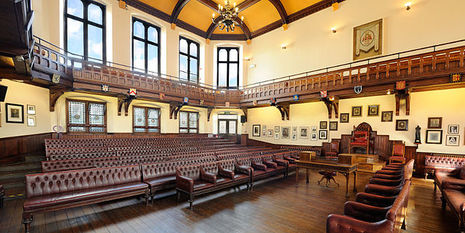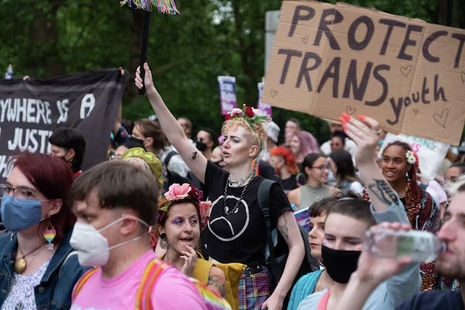Gender Wars: Where are the trans voices?
Dion Everett questions the one-sided approach of Channel 4′s exploration inro the so-called ‘gender debate’

I’m never surprised and always disappointed by the UK media. My particular cause for concern of the week is the sympathy thrown in the direction of so-called ‘gender critical’ thinkers in documentaries which play at neutrality. Most recently, this phenomenon has been seen in The Witch Trials of J.K. Rowling (The Free Press) and Gender Wars (Channel 4). How is it that documentaries whose synopses hint towards something of a balanced discussion end up offering more screen time and more understanding to TERFs and TERF talking points than to the voices of trans and non-binary people?
Out of its seven episodes, The Witch Trials of J.K. Rowling features only two adversarial speakers, with the rest of the air-time being offered to Rowling and her pleas for sympathy and understanding (for those interested in her inclusion, I would recommend watching Natalie Wynn’s video). Gender Wars allows prominent ‘gender critics’ such as Kathleen Stock and Julie Bindel to talk about their lives fighting for women’s equality, emphasising how terrible and heart-breaking it is to be attacked by the ‘transgender mob’. The trans and gender non-conforming people interviewed by Gender Wars appear as talking heads, and it is Katy Jon Went, a fairly centrist figure who believes that the conflict can only be resolved by hearing out both sides of the debate, who is given the largest amount of screen time. Prominent figures in the pro-trans academic scene, such as Professor Stephen Whittle and Dr Finn Mackay, are also given a moment to speak, but the lens through which they are viewed and the time afforded to their perspectives is not comparable to the empathetic view given, in particular, to Stock.

Gender Wars begins by setting itself outside the Cambridge Union ahead of last year’s debate on the right to offend, which sparked protests from the student body, including the memorable speech from Trinity undergrad Kass Caldicott who, rather than examining the motion at hand as a speaker for Stock’s own side of the debate, chose to directly address the House with their displeasure at Stock’s invitation. The clipping of the debate shown in the documentary positions Stock as the rational head amidst a sea of irrationality, and this appears to be the aim of the documentary as a whole. By featuring elements such as Stock’s bold (and scientifically inaccurate) proclamation that biological sex is binary, set at birth, and unchangeable, and leaving that statement largely unchallenged, Gender Wars shows Stock’s views as not only credible, but logical and scientifically based.
“The documentary positions Stock as the rational head amidst a sea of irrationality”
The documentary goes on to rather heavy-handedly display the protests which occurred after the murder of Sarah Everard in 2021. Although this may seem like a valid part of the point raised by gender critics about the threat posed to women’s safety by self-identification laws, its inclusion suggests (though not explicitly) a direct connection between male acts of violence and murder, and transgender people. This is a move which has been seen countless times in ‘gender-critical’ debates. I will admit that there is a decent amount of examination of the ‘bathroom problem’ by speakers other than Stock and Bindel, with Went being given the most airtime to speak on the issue from the pro-trans side of the debate. Dr Gina Gwenffrewi mentions a time when, in fear of conflict about which bathroom she should use, she simply left her friends at the pub and went home. This is a significant personal anecdote which is not given the time to breathe afforded to the personal struggles of the gender critical speakers; what might have been a crucial moment of sympathy for transgender voices in the debate falls flat.
“what might have been a crucial moment of sympathy for transgender voices in the debate falls flat”
What I find so peculiar about this whole thing is that Stock and Bindel, avid supporters of lesbian liberation, don’t seem to see the irony in their own words. Near to the end of the documentary, we get a long and personal insight into Stock’s own journey with queerness, in which she explains:
“When I came out, I found so much power. Everything about me changed, physically, emotionally. I felt so much more comfortable with myself.”
It’s fascinating, then, that she’s working so hard to prevent others from doing the same thing. Bindel evokes sympathy as she says:
“All of a sudden I’m not someone who’s fought for lesbian liberation, women’s rights, against rape, against domestic violence. I’m just an anti-trans bigot, and that hurts.”
Nobody is saying that these women haven’t worked hard for the liberation of cisgender women and lesbians. There is no denying the important progress that has been made over the past thirty years for women’s equality and liberation, and no denying Bindel’s part in that fight. That doesn’t prevent Bindel from being a bigot. Neither she nor Stock are shown as extremists because they raise reasonable and inarguable viewpoints about male violence against women, lesbian liberation, and the joys of being out, but it is from here that they draw a connection to the unsubstantiated claim that trans liberation is a looming threat to cisgender women. It’s exactly this motte-and-bailey fallacy which Gender Wars exploits.
 News / Report suggests Cambridge the hardest place to get a first in the country23 January 2026
News / Report suggests Cambridge the hardest place to get a first in the country23 January 2026 News / Reform candidate retracts claim of being Cambridge alum 26 January 2026
News / Reform candidate retracts claim of being Cambridge alum 26 January 2026 News / Cambridge ranks in the top ten for every subject area in 202623 January 2026
News / Cambridge ranks in the top ten for every subject area in 202623 January 2026 Comment / Cambridge has already become complacent on class23 January 2026
Comment / Cambridge has already become complacent on class23 January 2026 News / Palestine activists project slogans onto John’s24 January 2026
News / Palestine activists project slogans onto John’s24 January 2026









